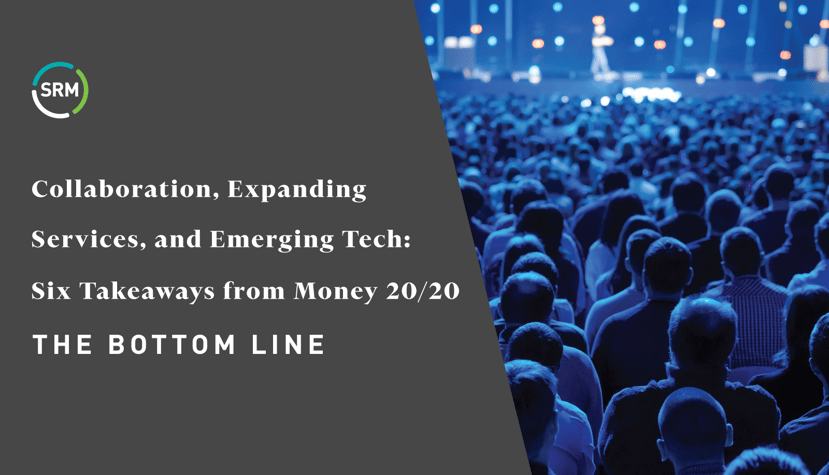
After attending my first Money 20/20 conference I came away with an insightful experience filled with thought-provoking discussions on the future of finance. Over four jam-packed days, I captured notes from 16 sessions covering a wide swath of topics that are sure to (re)shape financial services.
Now that I’ve had some time to think about the presentations and panel discussions, not to mention bouncing my thoughts off other financial services experts, here are my biggest takeaways from the conference.
More Collaboration Needed: My biggest takeaway is that innovation requires cooperation among banks, fintechs, and policymakers. Banks gain agility through fintech partnerships, but they must balance it with strong risk management procedures. Regulators need to modernize financial regulations for decentralized crypto platforms and tech-driven banking. How these stakeholders come together to shape sensible oversight while enabling progress will determine the winners and losers in the financial services landscape.
Equitable Access to Banking. This is a top priority. Several discussions addressed "banking deserts" in low-income areas and meeting the needs of the underbanked. I was intrigued by effort like Walgreens' partnership with NCR to set up 1,300 Allpoint+ cash-accepting ATMs in areas where traditional branches are sparse. Upcoming open banking standards will require FIs to share customer data via APIs, which could level the playing field between mega banks and smaller community institutions.
Asset Management for the Masses: There were several conversations focused on how to bring investment products to more people through embedded investing solutions in digital banking apps. At least $1.4 billion is transferred annually from bank accounts to investing solutions like Robinhood, Acorns, and Wellbull. About 80% of those outflows are from Millennials and Gen Z. Investment fintechs are stepping up to offering self-directed and robo-investing solutions to clients traditionally overlooked by a bank or credit union’s wealth management business. Embedding an investment app provides a much-needed product to a large segment of the client base. Doing so can stem deposit flows, generate trading revenue, deepen client relationships, and ensure frequent engagement with those using the app.
Instant Payments Momentum: Interest is building for real-time account-to-account (A2A) platforms due to the emergence of platforms like FedNow. Instant payment rails could disrupt the card network duopoly of Visa and Mastercard, while pay-by-bank offers a compelling alternative. Aligning new payment schemes – domestically and across borders – remains a huge challenge. There are no easy answers. Changes will likely involve a mix of market forces and regulatory mandates, but the end-state of instant, always-on digital money movement seems inevitable.
Crypto/Blockchain: The tone seems to be shifting in a more positive direction after a rough two years. Moves by big mainstream players like PayPal, BlackRock, and Citigroup help legitimize the space, signaling that blockchain could transform payments. It also shows more FIs are investing in revolutionary ways by enabling transactions that are faster, cheaper, more transparent, and available around the clock. Regulatory uncertainty persists, especially in the US, which risks falling behind more-progressive countries. Multiple speakers noted how lawmakers need more education on crypto's risks and benefits. Getting the legislative framework right will determine whether cryptocurrency can achieve its full potential.
Artificial Intelligence: AI is generating both excitement and caution. FIs are pursuing strategies that include hyper-personalized marketing, chatbots, and transaction monitoring. AI promises operational efficiencies and better customer experiences. Still, there are risks around bias, explainability, and ethical practices. With outcomes driven by opaque algorithms trained on imperfect data, AI requires governance to ensure it doesn't inadvertently harm underserved groups. Regulatory guidance is sparse for now, but with AI implementation accelerating, federal agencies are starting to take notice.
The Bottom Line
I greatly enjoyed attending Money 20/20 and certainly hope to be back in 2024. The conversations were enlightening and certainly give me an underlying excitement for the trajectory of financial services. I look forward to sharing these learnings with FIs as they evaluate the landscape and chart a strategic direction for the near- and long-term future.


